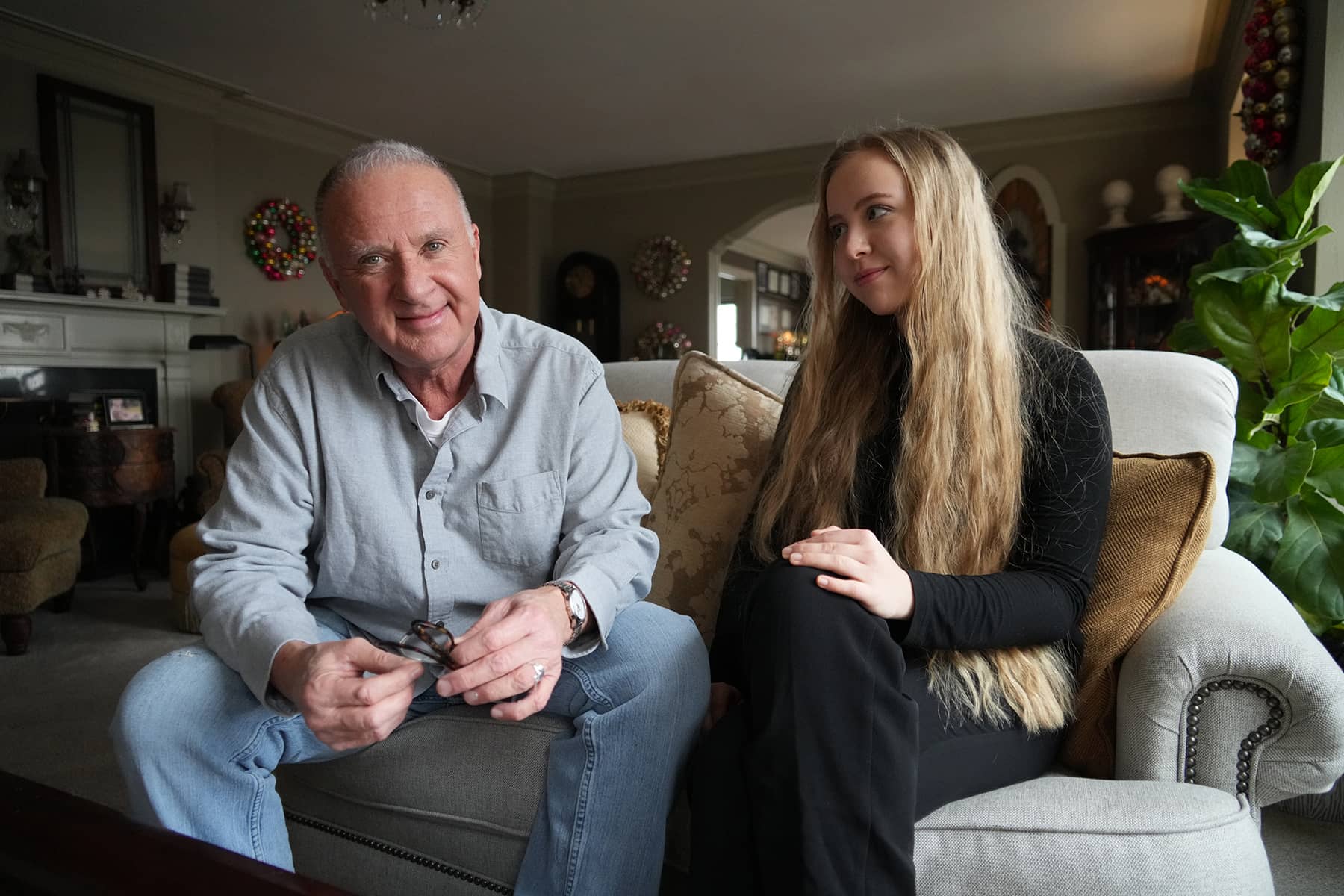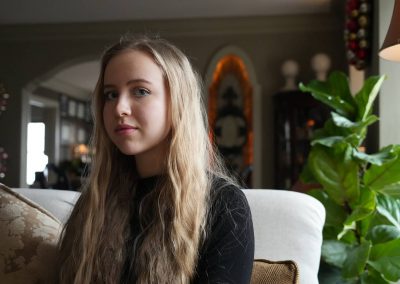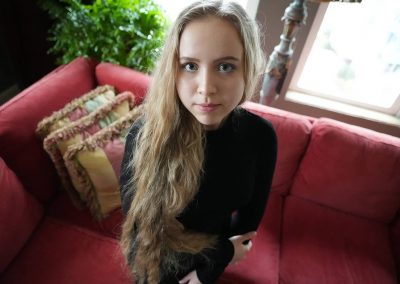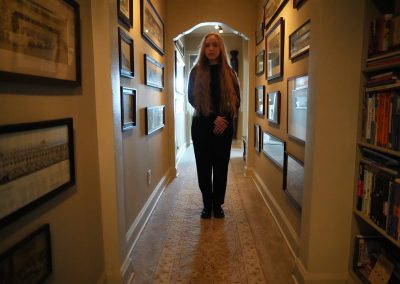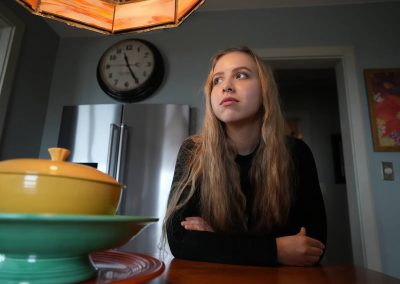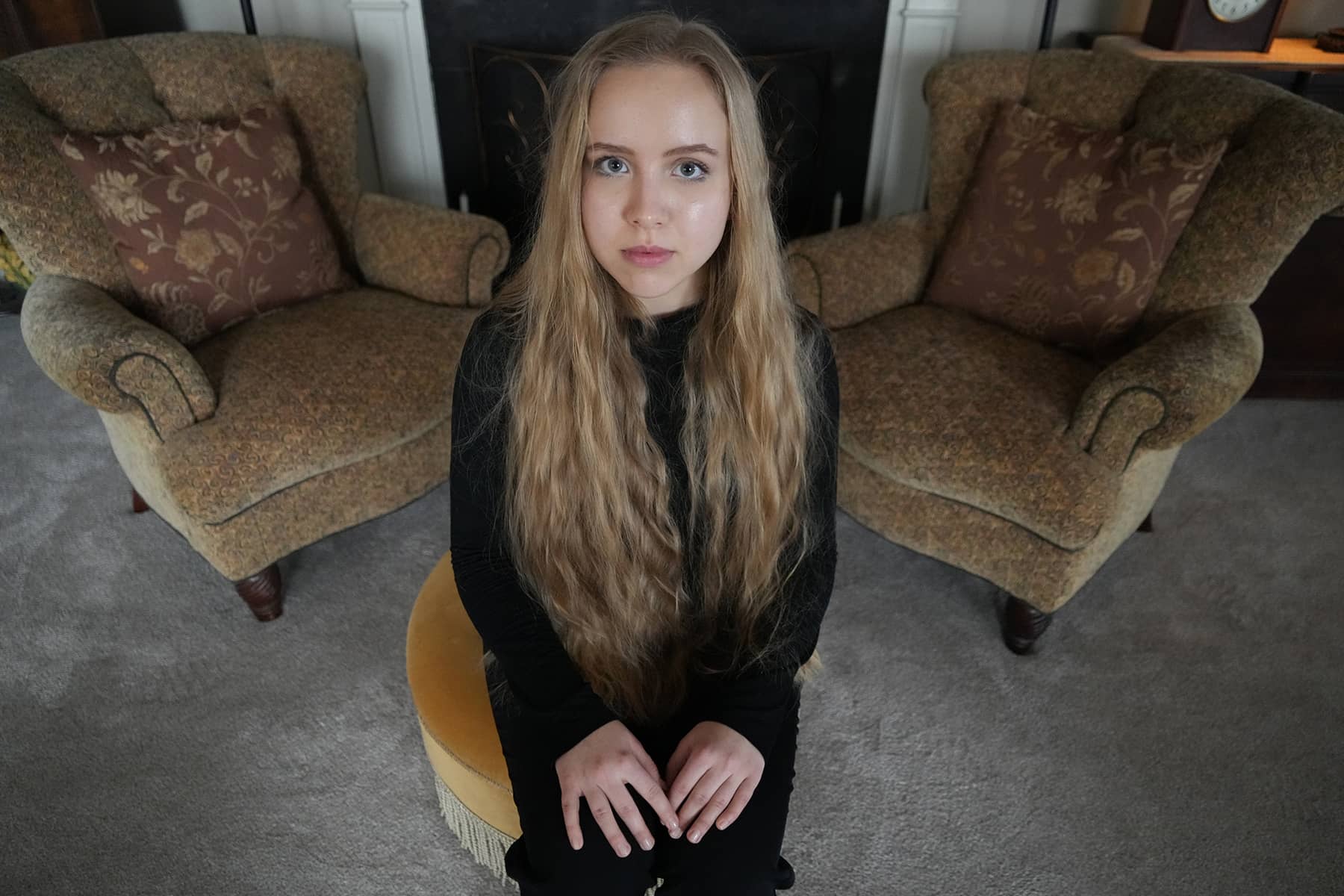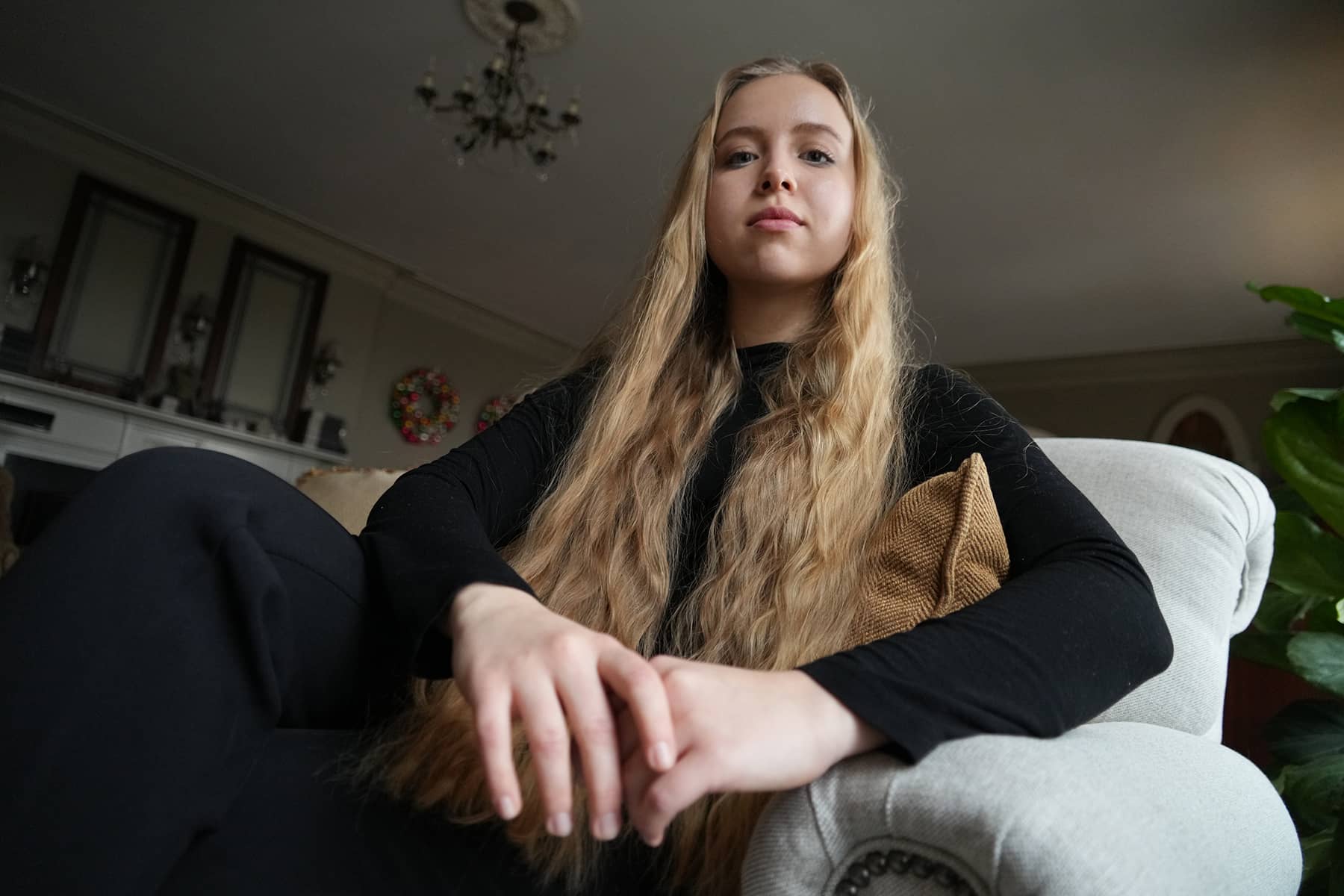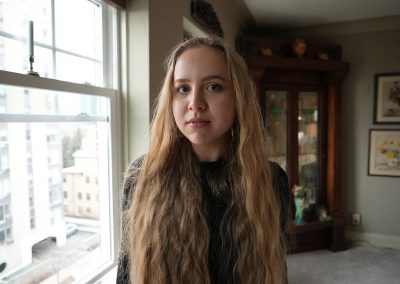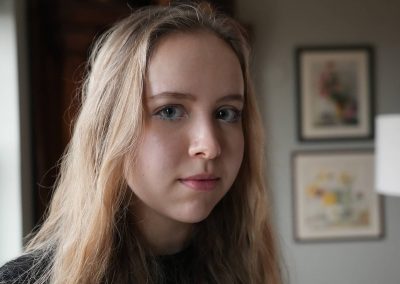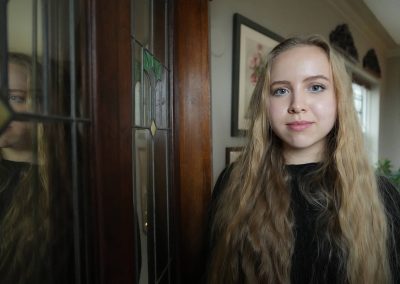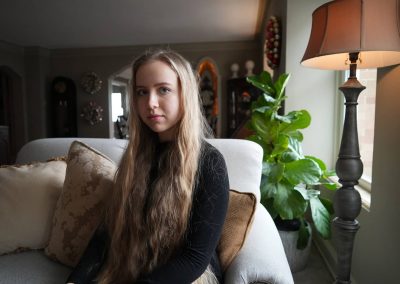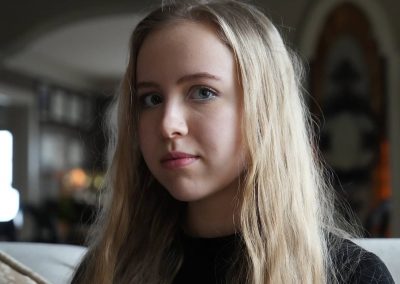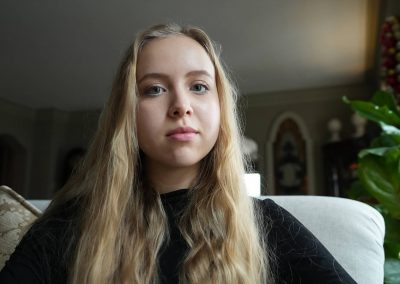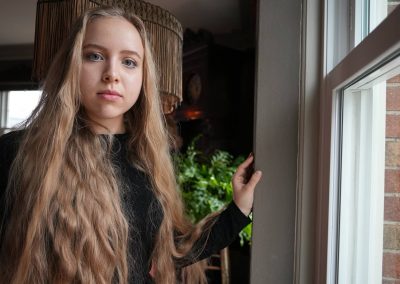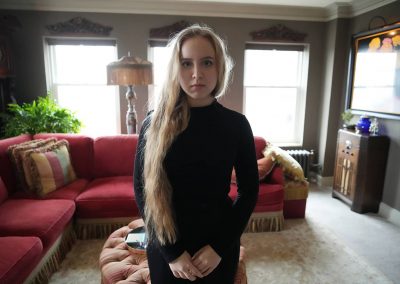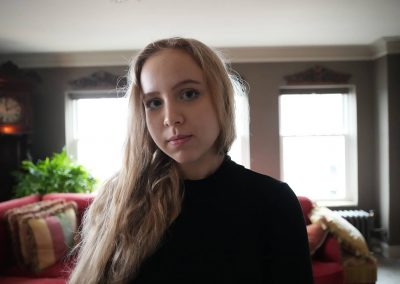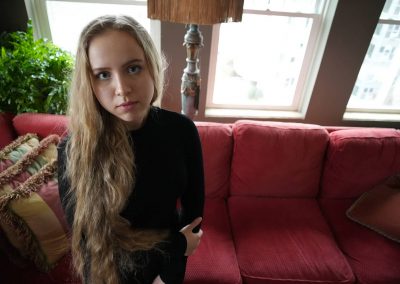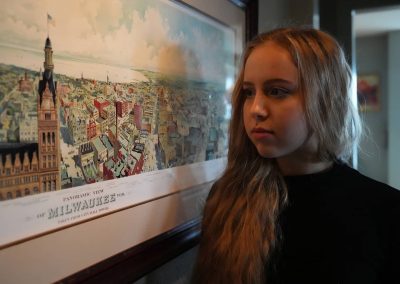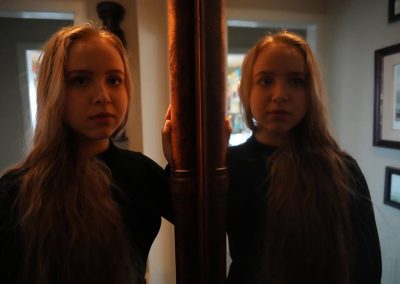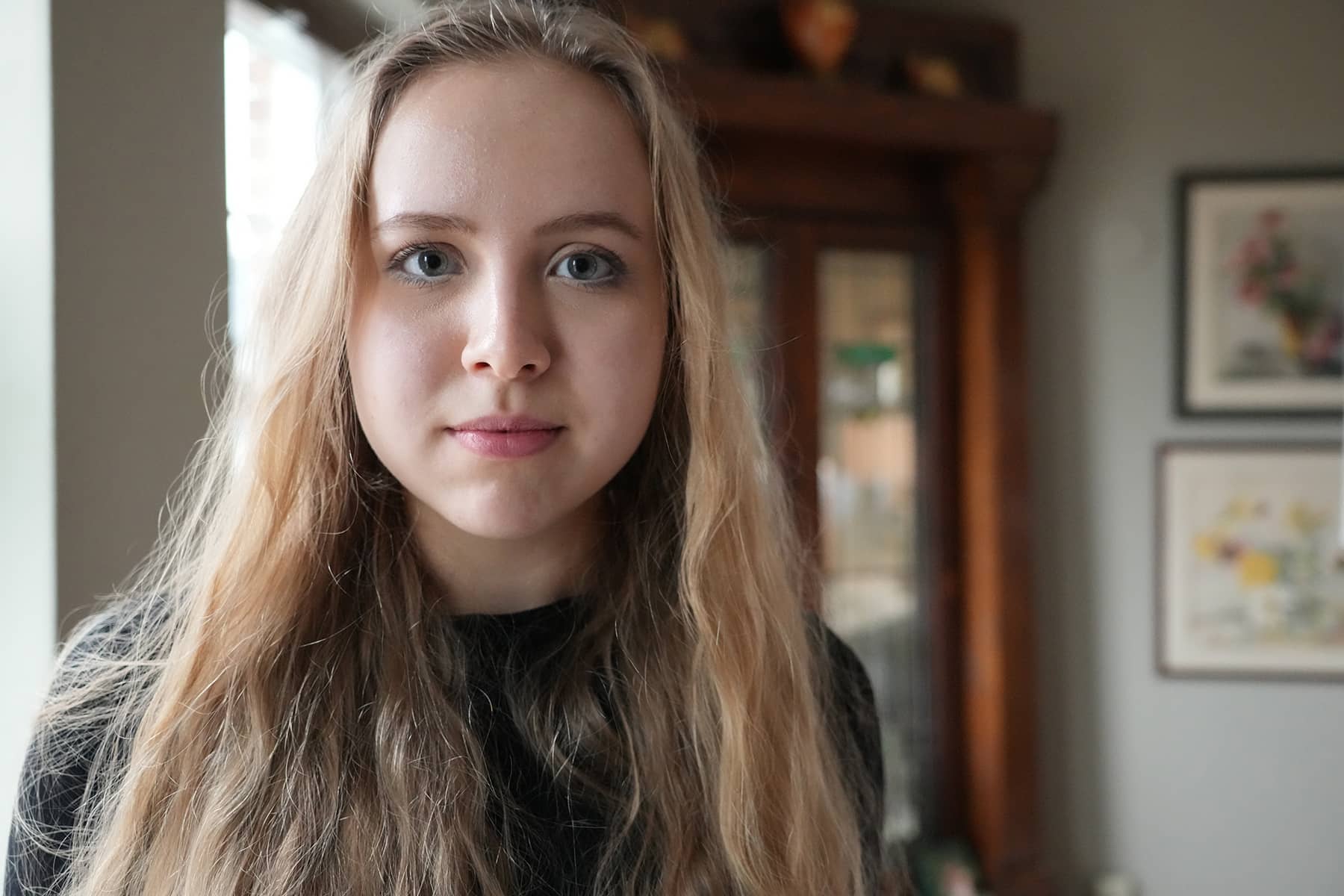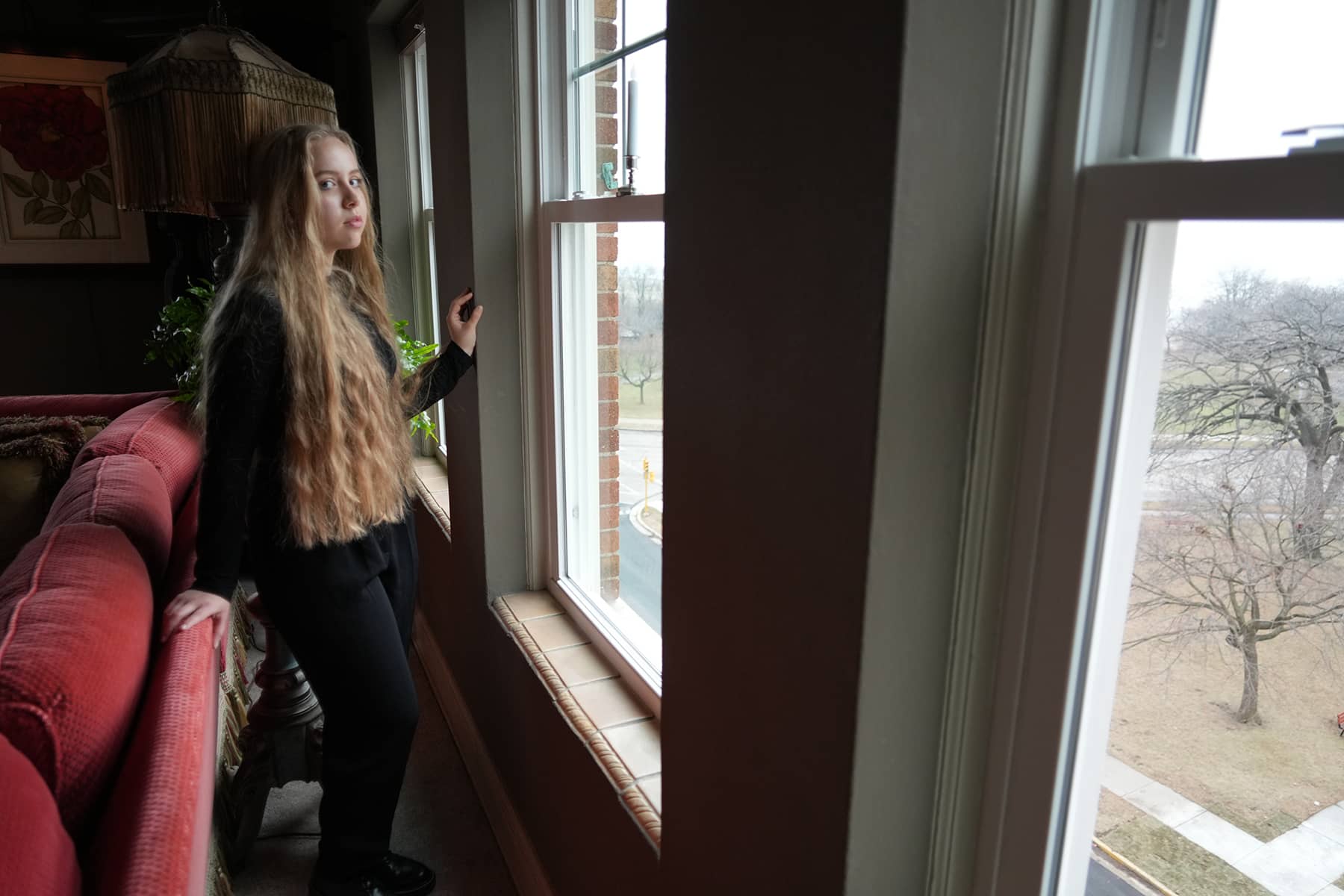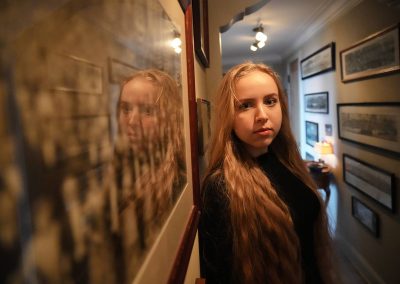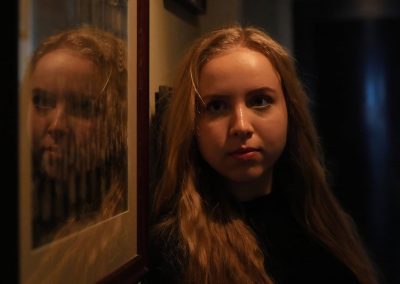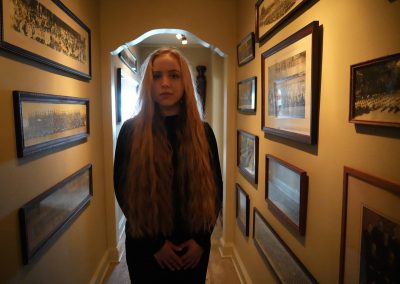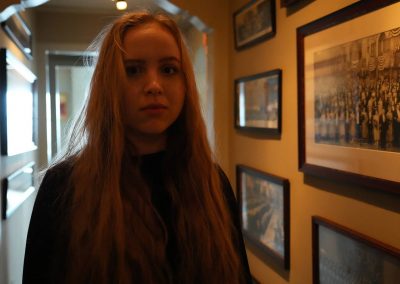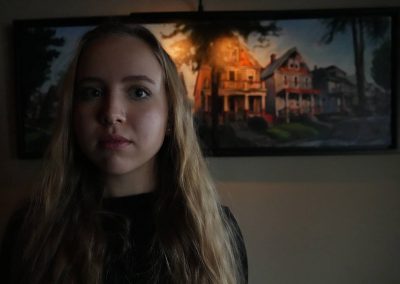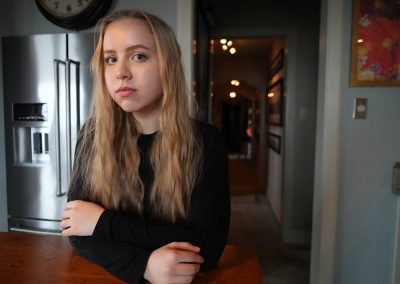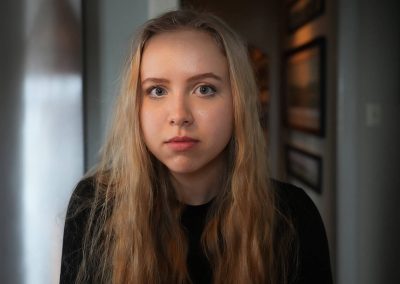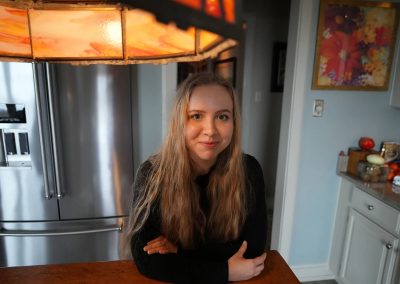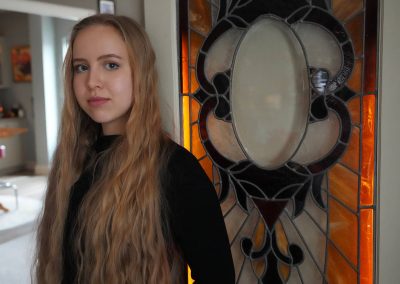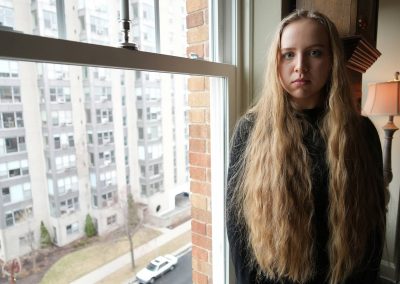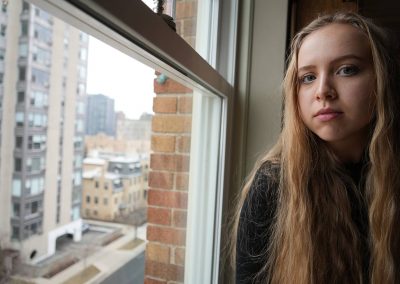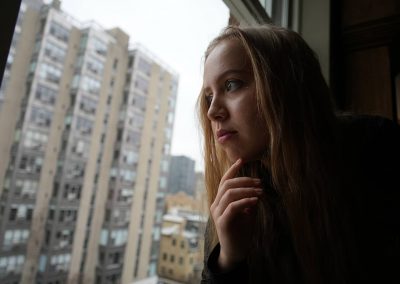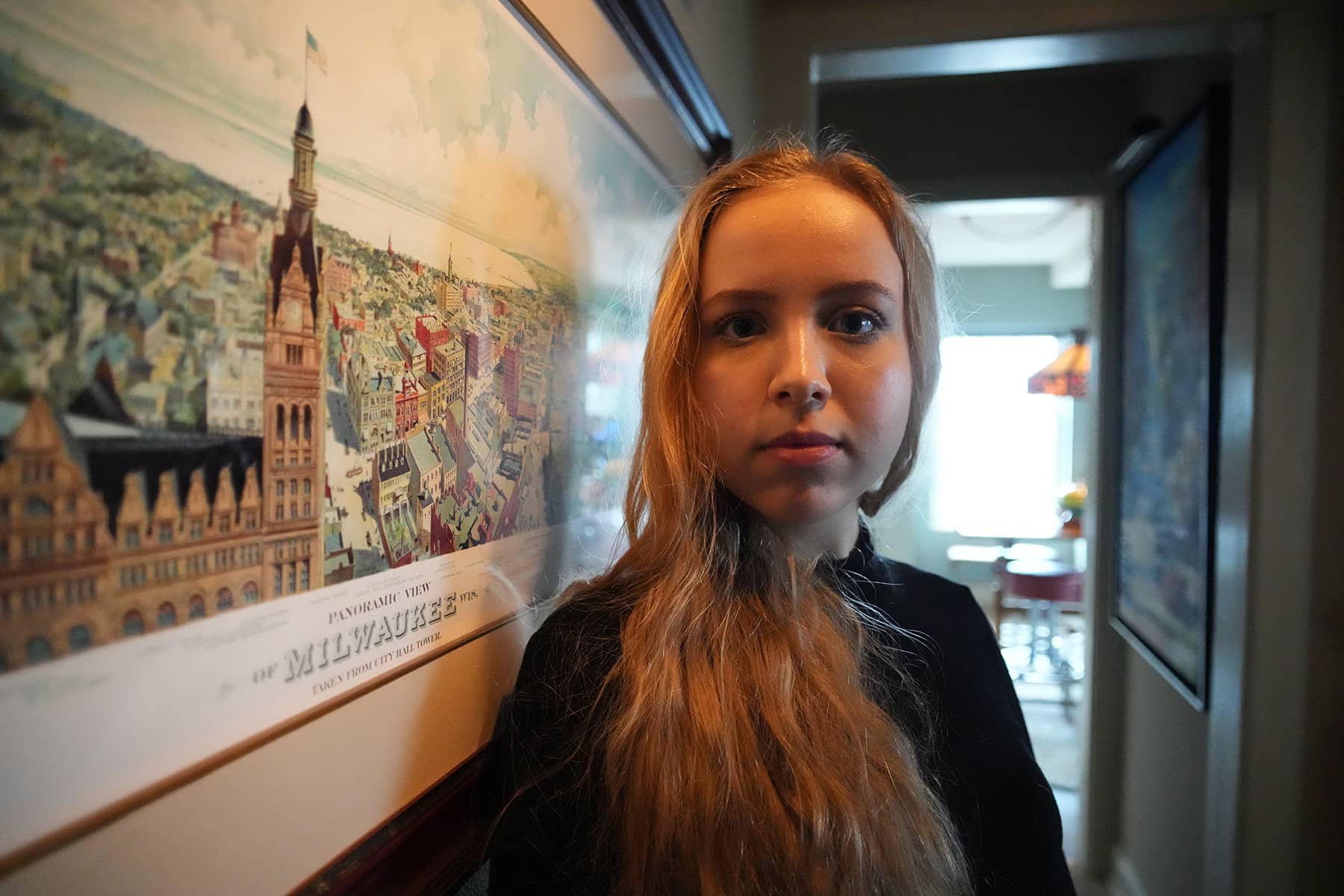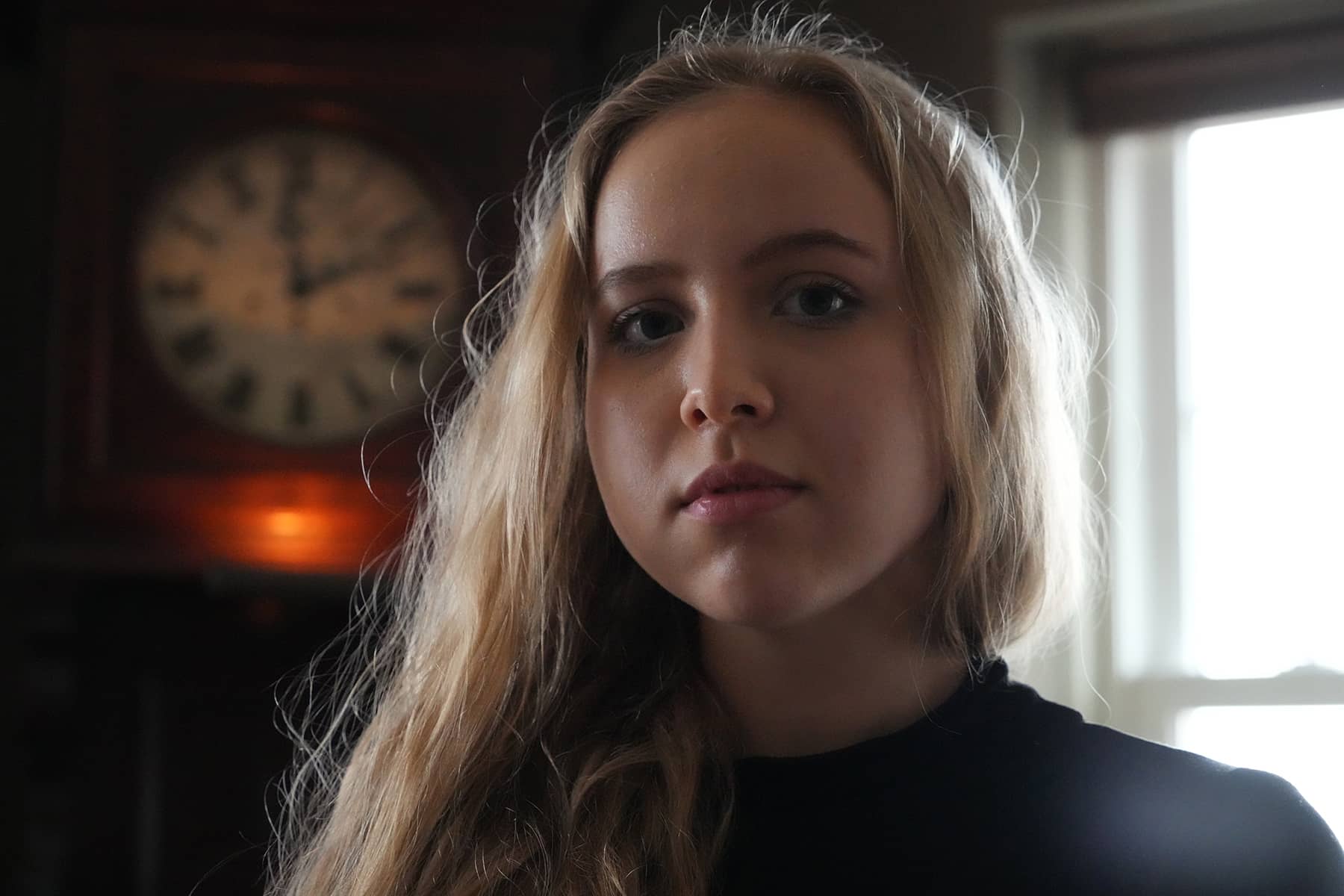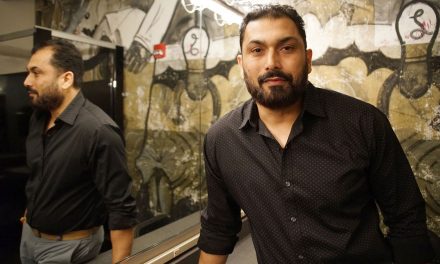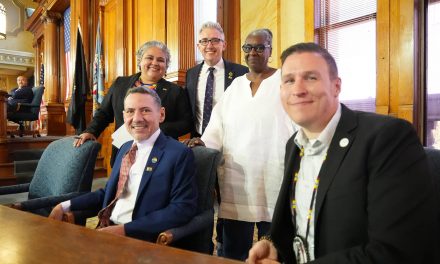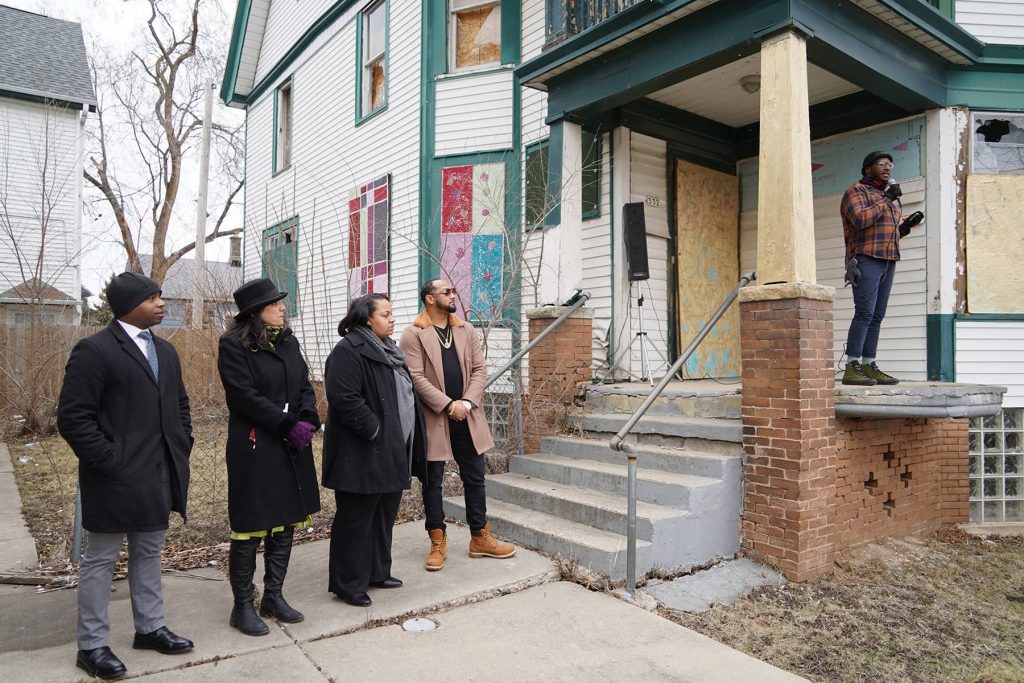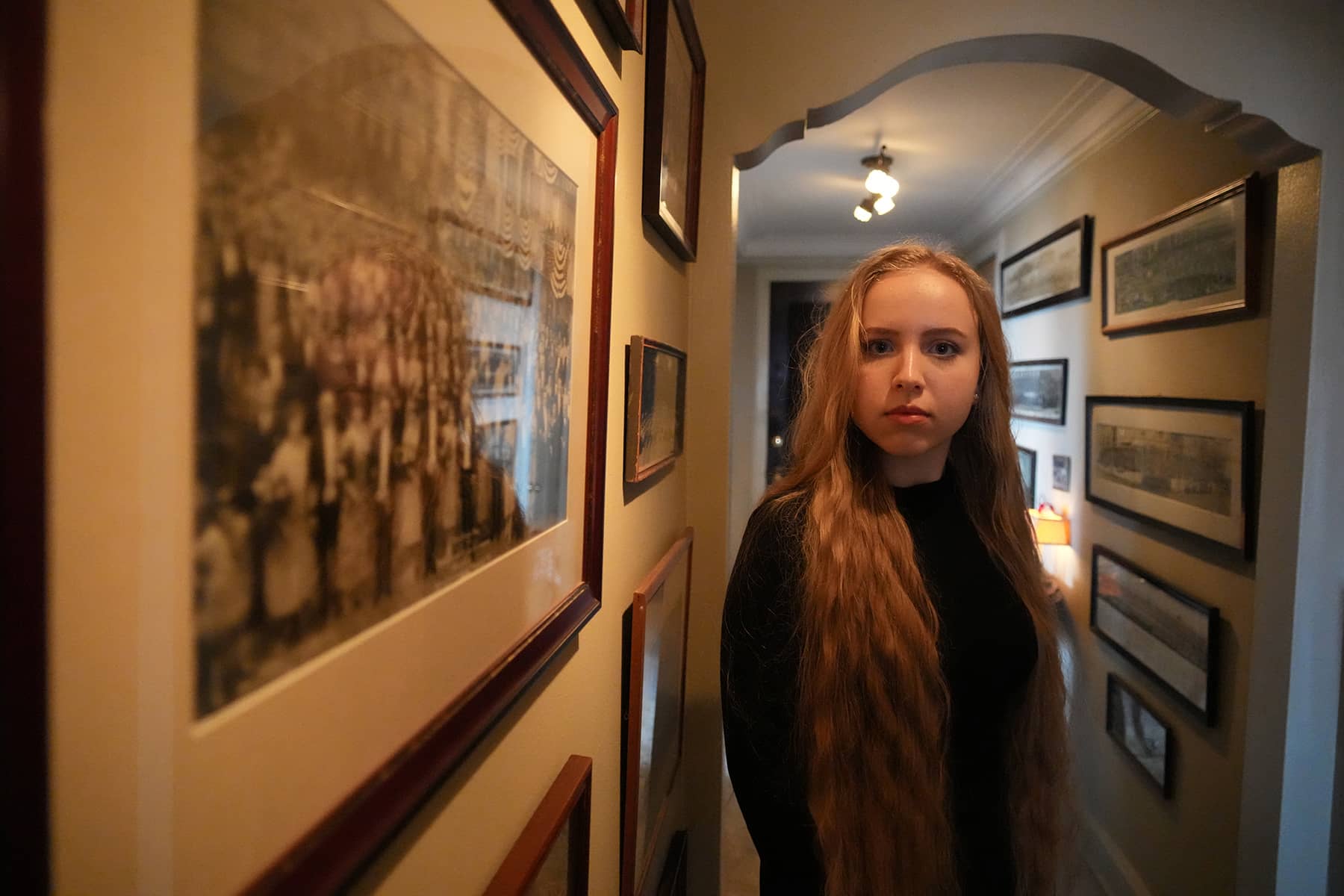
Lola Vaganova’s Ukrainian great grandmother was 20 years-old when the Second World War started. She became an “Ostarbeiter,” a Nazi German designation for foreign slave workers gathered from occupied territories to perform forced labor in Germany. She refuse to talk about her experience, and the only thing family ever learned was that she had lived in a village near Oppeln, Germany. Eight decades later, her 20 year-old great grand daughter would find herself fleeing Ukraine due to another war, and following in those footsteps. Vaganova’s first stop as a displaced refugee from Izium was Oppeln, Germany, now known as Opole, Poland. A terrible history had again repeated itself.
Russian dictator Vladimir Putin launched his full-scale invasion of Ukraine with the expectation that he would conquer the nation within 3 days. The unprovoked war that he started is inching closer to its one year anniversary, exposing the utter weakness and brutality of the Russian military. In the early days of the invasion, the American public was riveted to developments by the hour. Ukraine continued to defy the popular belief that it would fall, and instead won battle after battle to drive out the invading army. While support for Ukraine did not waver, over the following months the attention of most Americans about Ukraine did.
Milwaukee Independent sat down with Lola Vaganova, who turned 21 over the summer, just after Christmas to talk about her experience as a Ukrainian refugee in Milwaukee. Vaganova’s poems were previously published in the article Lola Vaganova: Poems written in Ukrainian bomb shelter offer a powerful witness of war to Milwaukee. At the time, she was not ready to share her personal story, which was understandable considering all the trauma she had experienced.
But it was the same courage Vaganova showed when she stood up to read her poems at the Boswell Book Company’s Ukrainian-American Poets Respond event, that finally brought the young refugee to share her heartbreaking journey with Milwaukee Independent.
In the comfort of our Milwaukee homes, with the benefits of our American way of life, it is easy to become detached from world events and the suffering around them. For Vaganova, Milwaukee has become her new home, but it is superimposed over her old life in Ukraine. As a voice in Milwaukee, she should be heard. If her story makes readers uncomfortable, perhaps they should examine the privilege of their comfort.
Like so many people who have fled conflicts, going back to the founding immigrants who settled in Milwaukee to escape from the upheavals in Europe, Vaganova stands as a reminder of the value of what we have. To ignore the journey she suffered is to ignore her bravery to overcome such terrible obstacles. It also ignores the inspiration of her ability to work hard in Milwaukee to not only find safety and survive, but to thrive and become successful.
Every day that Ukraine fights to preserve its democracy is another day that American lives do not have to fight. Were Ukraine to fall, any number of NATO countries would be threatened by Putin’s lust for Empire. A move against Poland would ensure that the great grand children of World War II veterans from Milwaukee would find themselves again fighting on European soil.
Vaganova shared her journey to Milwaukee as a witness to the war, why Ukraine needs continued help from America, and her thankfulness to the caring souls in her adopted city who selflessly support her and others, providing a safe space to let go of the trauma and embrace a life of peace in our community.
The Ukrainian city of Izium was the site of periodic fighting during the Russian-Ukrainian conflict in 2014. Locals referred to the Sloviansk-Izium highway as the “highway of death” during that summer. In May 2022, Russian forces gained control of the city after the Battle of Izium. The campaign started in March 2022, because of Izium’s importance as a transportation hub. The Russian military wanted to capture Izium so its forces in Kharkiv Oblast could link with troops in the Donbas region.
Ukraine began a counteroffensive in the Kharkiv region in early September 2022, and liberated Izium. After driving off from the Russian invaders, local police officers found a mass grave of 440 bodies. More than 80% of the town infrastructure was destroyed, and an estimated 1,000 people lost their lives under the harsh Russian occupation. Izium’s population decreased from 50,000 people to just 10,000 due to the war.
Lola Vaganova spent the first 18 years of her life in Izium. “Изюм” literally translated as “raisin” in English. Izium is located not far from the Ukrainian-Russian border on the Donets River in Kharkiv Oblast. Kharkiv was the second-largest city in Ukraine.
“When I was growing up, the most influential person in my life was my Mom. She is a teacher, actually, of the Russian language. I owe everything that I have right now, and the person that I am to her. Since childhood, she was always spending time with me. She really influenced me, and the personal character that I have. I feel like she has always been super supportive. And of course, my Grandma was influential as well. She was also a teacher, but of the English language. Those two had the biggest impact on my life. But, I have also made a lot of great friends and mentors in Poland and here in Milwaukee.”
When Vaganova thinks about her hometown, she is filled with the memories she holds in her heart. While Izium may be a small town, it is famous for its strawberries. The area has a special kind of soil that is perfect to grow them. Every summer Vaganova would participate in strawberry festivals and concerts. Now in Milwaukee, when she sees a strawberry it is a reminder of home. Ironically, she is not overly fond of the fruit, but it stands as a symbol that keeps Izium alive in her heart.
In high school, Vaganova became interested in a career as an English language teacher, because of the example of her English teacher. The passion for her profession, along with the teacher’s intelligence, were inspirational to Vaganova. However, she later discovered that teaching was not one of her best skills. As much as she liked children, the job of teaching was too stressful and had too much paperwork. When she finished high school at 18, Vaganova went on to college to study languages at Kyiv National Linguistic University.
“I decided to stay with languages, but go in a different direction to be an interpreter instead. It was work that would let me socialize with people and travel. So that’s what I wanted for my career while I was studying at my University. I didn’t really want to be a translator, because as a translator I would just sit in a room like a writer does and work on my own. A translator can be really isolated, and not have many chances to be around other people. That’s pretty boring for me. So becoming an interpreter would be more fulfilling. It can be stressful communicating realtime conversations, but it was something that I thought I could accomplish. I could be a translator during conferences and meetings, so I could do important work.”
Vaganova has been writing poetry since her childhood days. When art contests were held at school, children used to paint or make things with paper, like origami. But Vaganova was always drawn to poetry. She wrote some, but did not become serious about writing until high school. Two years later, when she started studies at her university, Vaganova decided to challenge herself by writing poems in English.
“I have written a lot of poems, but most have remained private. I have never shown them to anyone. It has meant so much to me, that I could finally open up and share some of my poetry in public. At the Boswell poetry event in December, I read three poems to the audience. I had not even translated them yet, I just read in Ukrainian. It was emotional for me and a little bit challenging, but I felt I did a good job. Many people there were moved by my words. I can’t explain it. Poetry is just something in me. Some people start writing diaries, or are drawn to music so they start writing songs. For me, poetry is an artistic expression but also kind of therapeutic. I finally started having therapy sessions here in Milwaukee. My therapist told me that I have to express my feelings somehow. I found poetry helps me to do that. It’s amazing.”
Poetry became a vital way for Vaganova to express her emotions, but it was also a form of creativity as well. Vaganova said that when it came to writing, she really did not like following the rules of poetry. She had studied how poems were structured and how they should be written. But when she was in the moment of composing her thoughts, when her emotions were the most raw, the words just come flowing into her head, and she wrote them down.
“I don’t really care about the rhythm and form. So that’s how it is for me, not following the rules when it comes to poetry.”
The COVID-19 pandemic hit while Vaganova was studying at her university. Because of the social distance protocols, all her studies were shifted to an online forum. After she finished her exams in early February, she decided to travel back home to Izium. If her classes were going to be online, she could take them from anywhere. At the University, she lived in a dorm shared with several other roommates. She said it was not the best experience and preferred to be at home where she would be more comfortable, and could focus on her studies. By mid-February she was safe at home, but that condition would change abruptly a short time later.
“I remember very vividly the 24th of February, because before I left the University our professors told us to be safe and remain in contact no matter what. At the time I thought, ‘what did they mean, no matter what?’ They should stop being negative, everything was fine. But on the 24th, I could not really sleep. I remember waking up at maybe 5:00 am. As I woke up, I reached for my phone and started checking social media. One of my schoolmates who lives in Western Ukraine, she texted me – which was unusual because she usually slept until noon. But at 5:00 am she was up and I got a text from her asking, ‘how are you?’ The worst had started. I could not believe it. Then I just ran out of my bedroom. Our neighbor came and started knocking on our door, shouting that we should grab our things because the war had started.”
Vaganova said it was impossible to believe at first. But as she started checking all the news, she saw that it was really happening. There was a lot of panic in the town that day. Kharkiv was the first town that Russian forces attacked, which was only about an hour drive by car from Izium. When the air raid sirens began roaring, and the situation became more terrifying. Thinking about how to survive, Vaganova’s mother went to the grocery store. She bought essential items for the family to eat, but ironically they would never had a chance to.
“That day the Russians did not come for us. I remember the lines of people trying to buy medicine, but the pharmacies were out of stock of everything. It really felt like the end of the world, and it sure seemed to be. Later we went to bank after back to withdraw some money. But the same thing, all the banks just ran out of cash. The lines were horrible and we had no luck getting the things we needed, so we just went back home.”
During that time Vaganova was also contacting everyone who she knew and cared about. And people were doing the same in return with her. They speculated about what could happen, and it all still seemed surreal.
“I remember thinking ‘it’s just a movie, these things cannot happen in our time. They can happen in Hollywood but not to us.’ So yeah, that’s how the 24th of February was for me. And that’s what I will remember until my last day.”
Vaganova’s family stayed in Izium until the 6th of March, and then evacuated to Poland. But in those first two weeks it was a nightmare from which she could not escape. Part of her had a hard time believing it was all actually happening, until the bombings took place the very next night. Vaganova lived in the center of Izium, far from the outskirts where the attacks were taking place. At first the invasion did not affect her family, or a lot of other people. On that second day, pictures were posted online about places in Izium that had suffered because of the bombings.
“And then on the third day, that’s when it really started. It was the scariest night of my life.”
Her house lost power when the electricity was cut off. There was no WiFi, just a bit of mobile phone service. That evening the gas was cut off, so there was no heating. It was extremely cold, and Vaganova’s family went to bed bundled in their clothes. They wanted to be ready to leave in case the worst happened. The family had a nearby wine cellar, so they considered taking shelter there. Thankfully they did not, as a later bombing would obliterate it.
Fully dressed in her bed, under blankets and winter coats, Vaganova was exhausted and fell asleep some time before midnight. She remembered hearing something like explosions, but thinking it was part of her dream. Until her mother abruptly woke her saying that the bombs were getting closer.
“We didn’t have enough time even to run to the bomb shelter. That was a 15 minute walk and my Grandma had problems with her knees, so she could not run. We had no choice but to take cover in our hallway, which had no windows. We closed all the doors to the rooms. We brought some blankets with us, comforters to cover ourselves from the cold and if things exploded. I was just lying there face down on the icy floor. It was the scariest experience of my life.”
Russian planes terrorized Izium that night. They flew over Vaganova’s house, and she could hear the sound of their engines as they approached. They were dropping bombs anywhere and everywhere. The Russians did not care what they hit, so there was no sense of what place would be safe. Vaganova’s house was also close to a hospital, and many had already been targeted in attacks. Vaganova was frightened that the Russians would aim for the hospital and miss, hitting her home.
“It was a terrifying time, but I also felt relief and thanked God each time an explosion didn’t hit my house. So many explosions came close, plane after plane dropped their bombs. But each time, they missed my house. I was lying in the hallway, holding my Mom’s hand, and just praying each time a bomb fell it’s not our house. I thought, I have so much life ahead of me, so many plans and goals I wanted to accomplish. I had not fulfilled my purpose yet. I prayed after each explosion that the next one would not take me, so I could go on living. I just held onto my Mom’s hand and prayed. I prayed for my family, I prayed for my neighbors. I prayed for help to escape from the nightmare of terror. The bombing continued all night and we could not sleep.”
In the morning, when there was a little mobile service available, Vaganova learned how her hometown had suffered during the night. Residential buildings had been destroyed, with an unknown number of mass casualties. Even the police station, just a 3-minute walk from her house, was also bombed. Vaganova’s home was on hundred years old, and another night of bombing meant the family probably would not survive. Even if the structure did not get hit, the house could just fall down on them from all a shockwave. So they decided to go to the bomb shelter. The family took some of possessions, just documents, some warm clothing, two bottles of water to be shared by the three of them, and one loaf of bread.
“At the bomb shelter I could already feel like I was in a safer place. I read messages from my classmates telling me that they knew what had happened in Izium, and that they love me. That was when I could no longer hold back my tears, I just cried. There were a lot of people in the bomb shelter, but I did not care at all. And that’s when I decided to write those poems. I posted the two in Ukrainian online as quickly as I could. If something were to happen to me, at least people could remember me by my words. I didn’t know if there would be a tomorrow or not for me.”
Vaganova said that she actually did not remember how long she was in the bomb shelter. Every day seem to be the same. She just remembered how difficult it was sitting there, and not knowing what time it was, not knowing whether it was day or night. Eventually they had to shut their phones off to save the battery, since there was no electricity to recharge them. Vaganova wondered when her family would have to evacuate. Otherwise, she just sat there for hour after hour, day after day.
“I could not read anything because there was no light. It was complete darkness. Some people had flashlights, but it was not enough. Outwardly, time just froze in that bomb shelter. Inwardly, there was too much time to think, too much time to wonder how much time I had left in my life. I remember thinking about the poems I wrote and posted, and how emotional I was while writing them. That’s why I didn’t care about rules and rhythm. I just wanted to say something to the world. I wrote them in dim light, and my eyes were filled with tears. But I showed them to some friends who had also escaped to the bomb shelter with us, and they started crying too. That’s when I understood I had written something important, because it touched people as much as it did me.”
That was the only moment of peace she had in the bomb shelter. Otherwise, it was a horrible situation, sitting there and being unable to sleep. Vaganova had only a chair the entire time, there were no mattresses to stretch out on. It was exhausting, and everyone had pain in their back or legs. They could never get comfortable. It was like that night and day, over and over.
It was not living, it was surviving. Vaganova ate one thin slice of bread for breakfast and then one for lunch. She could only drink a sip of water from what they had brought. The Russians had cut off water across the town, and the bomb shelter was too far away from any place where they could obtain more. The Russian attacks also came at irregular times, so it was impossible to predict when to even try and venture out.
One morning Vaganova’s family decided to go back to their house and get more supplies. The Russians had mostly bombed the town at night, so they reasoned it would be safe to make a trip. They got to the house, collected more food, and just as they started to leave to return to the bomb shelter, another attack started.
“There was no way to understand what was happening, or what direction the bombs were going. If we started running to the bomb shelter, we could be running right into the attack. That was actually how many people would die. They ran from their home to the bomb shelter in a direction they thought was safe, only to be killed by Russian bombs. So we just stayed in our hallway, laying on the floor, covered in blankets, and waited.”
It would not be until Vaganova had fled to Poland that she understood the full destruction of Izium, or the bravery of people to risked death in order to document Russia’s inhumanity and share what they filmed with the world. The graphic nature of the videos Vaganova saw were like the early days of the war, so incredible that they were hard to believe. She remembered one that showed her town’s central park, the heart of Izium, with bodies laying everywhere. Such an unspeakable horror could not be true, but her eyes showed her that those things had happened. In a place where families came to relax and play with their children, the Russians had left behind those they randomly slaughtered. It was hard for Vaganova to recognize the Izium she had grown up in.
“Every day that I had mobile service, my friends tried to call me from other parts of Ukraine. They all said I must to evacuate. And every time we tried, we would read the news. There’d be a report that people tried to evacuate from Izium on a bus, and then the bus would be found all shot up. Russian troops killed everyone on the bus trying to evacuate. It was so scary. We tried to find any services that could evacuate us, but there was nothing. So we decided to go with with taxi drivers.”
Vaganova’s family, and friends of her Mom, all decided one day that tomorrow they would evacuate. That night, Vaganova had no energy whatsoever. While others slept, she could hear the bombs and explosions, and thought that in the morning there was no way they were going anywhere. But at first light, they left the bomb shelter to grab some belongings from home. Vaganova just took a few items of clothing, one pair of jeans, one sweater, one pair of socks, some documents and not much else.
She did not take any personal items, or things that were precious to her. She even left behind her laptop. Looking back, Vaganova said that the stress and trauma of her situation left her not thinking clearly. She figured that the Russians had already bombed everything by that point, and there was nothing left for them to destroy. It had to stop eventually, and she would be able to come home in a couple weeks. Vaganova did not see the need to grab all of her things.
Later when they were running through the bus station, they located some volunteers with a mini bus. There was one open seat and they wanted to evacuate Vaganova. But one seat was not enough. Vaganova could not leave her family, plus they were evacuating with their friends. The group eventually found only two taxis left and took both. It cost them a lot of money, but it was life or death by that point. They were desperate to reach someplace safe.
“As we drove away from Izium, I remember I started crying. I could not even explain why. Probably I was feeling that I’m not coming back here. We left at 9:00 am and found out that another attack began at 10:00 am with more terrible bombings. We went to the the town of Slovyansk and waited a whole day for a train that could evacuate us to Western Ukraine. But it was an intercity train, which had wooden seats that are very uncomfortable. And it was already full coming from Kramatorsk, another town small town that was bombed as well that day. Our original plan was to go there and get on the train there. But thank God we didn’t.”
Vaganova’s biggest concern on the train was to find a place for her Grandma to sit, because of the problems with her knees. She fortunately found one, but the train was extremely overcrowded. People were sitting anywhere there was space, even in the aisle. But as uncomfortable as it was, Vaganova was with her family and friends on their way to safety.
Their train was supposed to go straight to Lviv, the biggest city in Western Ukraine. But it had to change routes for some reason related to the war, and the group ended up getting on another train. Vaganova slept in the aisle, sitting on her bag. Many people were doing the same thing. Vaganova said she was dehydrated from not drinking enough water. And it was super cold the whole time.
When they arrived in Lviv, it was impossible to find an apartment to rent, or even a single room. So the only choice the group had was to travel further to Poland. They contacted some friends there, who said that volunteers could provide accommodations and they could finally rest. The friends encouraged the group to hang on a little while longer.
“We were in another line for that train, and spent a whole day waiting in the freezing cold. March is a very bitter season. When we boarded, it was another intercity train – not a more comfortable passenger train. Then we spent a very long time at the Polish-Ukrainian border. When we finally got across, we found there were no volunteers to help us. Everything had been booked. Someone we met recommended we take another train to a town called Opole, and probably we could find volunteers there to help us. So another train ride took us to Opole, and we found people who accepted us into their home. I remember the first night, I was just sleeping. I didn’t want to ever wake up. Part of me wanted to believe that when I did wake up, everything I had experienced would just be a nightmare. It never happened. I would wake up in my bed, in my own room, and everything would be normal again. But no, that wasn’t reality. There was no way to wake up from the war. It was a waking nightmare. That was my journey to Poland.”
The first night Vaganova slept in Poland she remembered having no dreams whatsoever. But then, every day after that, she had the same nightmare about her hometown, about the evacuation, about the things left behind that were dear to her heart. Even in Poland, there were many things that were a trigger for Vaganova. One time a bottle of water fell and for an instant she thought they were being bombed. It still felt unsafe.
Vaganova also met many people in the Polish military, and all the soldiers said that they were ready to fight the Russians. They were preparing for an invasion. So, even Poland was not far enough away to really be safe from Putin’s war machine of genocide.
After a couple months in Poland, Vaganova’s family tried to find their own place. But that was impossible too. So Vaganova thought about what to do. She had already graduated from her university, so considered where she could go to follow her dreams and live to her potential. Ukraine would not be an option for a while, her future and everything there seemed to be ruined. Vaganova felt horribly lost during those days.
Some of her friends and schoolmates told her there were programs in the United Kingdom, Canada, and in the United States. The programs required that she find a sponsor, but after that they would help Vaganova to start her life from scratch.
Vaganova had never used Facebook before, but opened an account saying she was from Izium, detailed what happened to her, and asked could someone help become a sponsor for her family. After she wrote the post, she forgot about it for a couple weeks.
One problem her family faced was that her Grandma did not have a biometric passport. It made travel to the United States or Canada more difficult. When Vaganova remembered to check her Facebook account, she saw that some people from the United Kingdom had reached out.
She made the post thinking what did she have to lose? But also, Vaganova was not naive. She knew it was a risk. The people who reached out to her were all men, they were in their 50’s, and they were living by themselves. Vaganova did not feel that was very safe, so she decided not to accept any of the offers.
“But then someone else wrote to me about the United States and said she could become my sponsor, so I could start my life here. It was really hard to support ourselves financially in Poland, hard to find a job. Basically Poland could no longer provide us with accommodations to live in. So I thought I could go to America and if it did not work out, I could always come back. I studied English at University so I would have a better chance there to find work and make a life.”
At about the same time, friends of Vaganova’s Mom said volunteers and programs in Germany could provide accommodation and some financial support for Ukrainian refugees. But Vaganova never studied the German language and did not feel she could fit in there. Plus, the accommodation that Germany was providing were in dormitories, and that was too depressing for her.
“I talked to my Mom about America, and said that I could go with her to Germany if she wanted me to stay. But she told me it was my life, and that I should go and try. She said sometimes we have to learn from our mistakes. So along with my Grandma we decided that I should go to Milwaukee alone, and they would go on to Germany. I had all their love and support.”
Vaganova arrived in Chicago on the 22nd of June, but it was so late – and the process was so long to get her passport stamped – that by the the time she got through it was already the 23rd, close to 4:00 am. Her sponsor had driven down from Wisconsin to pick her up, and brought Vaganova back to Milwaukee. Because of the program “Uniting for Ukraine,” Vaganova came to Milwaukee under a “humanitarian parole.” It was not a visa, but a parole for a period of two years.
Considering herself a very ambitious person, Vaganova tried to continue living no matter what happened. But when she first arrived in Milwaukee, it was very hard for her to understand that she was finally in a safe place. She had food to eat, she had electricity, she had everything that people back in Ukraine did not have. And she felt guilty for it. Vaganova was making herself suffer, because she did not feel she deserved such things when so many were still suffering. Vaganova believed that she should be suffering with them.
“I didn’t let myself be completely happy, and it was hard to enjoy my life. But then I understood that way of thinking was not a great thing to do for my mental health. After staying in Poland then coming here to Milwaukee, for a while I didn’t know myself. Something changed inside me. I could not cry. I learned that so much of my behavior was a symptom of post-traumatic stress disorder (PTSD). That was why I could not cry, I was not able to express myself emotionally.”
After hearing the news that her hometown of Izium was liberated in September, Vaganova allowed herself to feel happy. It was an emotional day for her. She used to do a lot of physical exercise to calm herself down. That included running every day just to wear herself out, so she had no energy to think about anything. And then she could finally sleep. The news about Izium made Vaganova happy but also sad at the same time.
“I used to watch all the videos about my hometown, and I would be crying on the floor of my room in my friend’s house. I texted my friend and she came to my room and we both cried for an hour. I thanked her over and over, crying and hugging each other. It meant so much to me to have the support that I got from people here in Milwaukee. It’s been just incredible. I still cannot believe at times how lucky I am, that I am here, and that such good people surround me with so much love and understanding.”
How Vaganova attended the Boswell Book Company’s poetry event was another example of positive forces working to help her journey. She had a friend who assisted her with so many tasks, like getting a Social Security number, renting an apartment, finding a job, and also offered an unlimited amount of emotional support. One day Vaganova told her friend that she was interested in poetry.
“I never read her a poem, and forgot about our conversation. But some time later she saw the poetry book event at the Boswell Book Company and invited me to go. She was so supportive, holding my hand and hugging me. The experience meant so much. I was afraid that I would have a panic attack, but it turned out to be a wonderful opportunity. I was grateful to Olena Jennings and Krystia Nora for allowing me to share my heart by reading my poems in Ukrainian – I had not translated them at that time. Afterwards, people applauded me, and that meant so much. Not for what I accomplished, but because I didn’t feel alone. We were Ukrainians and we were supported, and our spirit was unbreakable. Reading those poems, like many other things in Milwaukee, has fueled my courage to work on my mental health, improve my life, and try to live the very best version of myself.”
When asked what she wanted the people in Milwaukee to know about her experience, Vaganova said that she was troubled by people in the United States – and around the world – who still did not believe what was happening in Ukraine. They choose to believe fringe theories that the countless videos of innocent civilians executed by Russian troops, or nursery schools destroyed by illegal Russian munitions, were not true. They refused to accept anything they saw online about Ukraine’s condition.
“I had friends in Moscow say that the things they saw on the news about Ukraine were just special effects made up on the computer. So I really hope that when people hear of my story, they will believe that this war is true, that people in Ukraine are suffering beyond imagination, and that our people need support. I also hope that, especially after the war ends, people all over the world who didn’t believe the war was true will open their eyes and mind and be able to accept what actually happened.”
In addition, it was Vaganova’s hope that all levels of the Ukrainian government could be faithful to the people they served. She really wanted to see them use the money that people from all over the world had donated for the purposes they were intended. Providing for Ukrainian civilians and the Ukrainian military, not going into a Mayor’s pocket.
“That is a topic that makes me very angry, when businesses don’t care about people or their suffering, and only about how to profit – like the Mayor of Izium. Even people who I met in Poland from Izium were furious with him, because he evacuated his family before the invasion even began and made no plan for how to save the city. He didn’t provide any means to help his citizens.”
The Mayor has also been accused of having a warehouse full of produce while people starved. It is said that he even kept it closed even after the town was liberated. Izium has been given emergency funds to restore electricity and water, but residents say there is still no electricity or water because the Mayor and his team have been keeping the money for themselves.
“It blows my mind that he would say he stayed in Izium during the occupation, yet he was spotted safe in Western Ukraine while his citizens were brutalized. So I really hope that people here in Milwaukee, and across America, will believe the terrible things that Russia is doing to Ukraine in this war. And I also hope that somehow our local governments in Ukraine will be supervised better.”
Lee Matz
Much appreciation to John McGivern for the use of his lovely home as the location for Lola Vaganova’s photo shoot.
